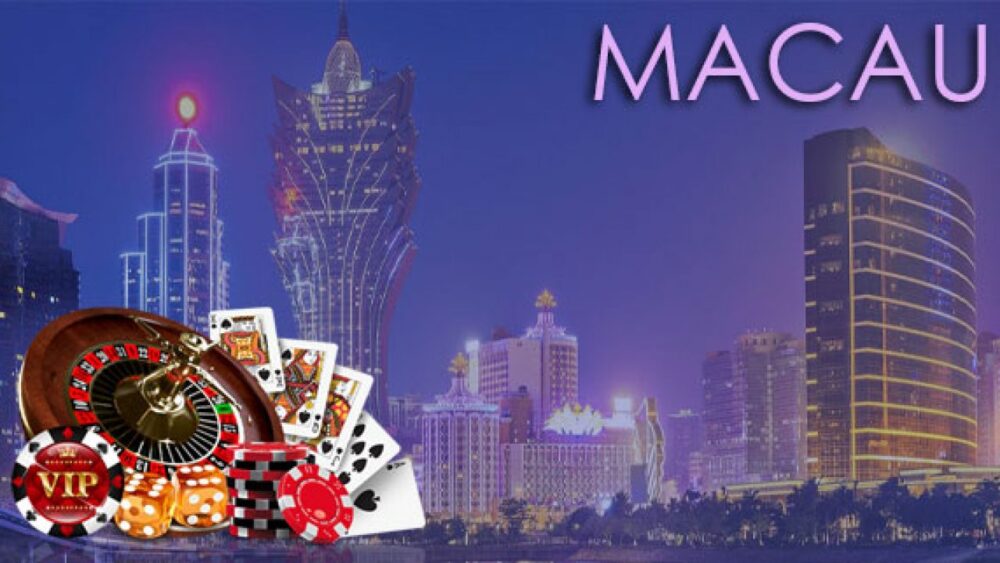
A major reason for Asia’s accelerating success in the international gaming industry is Macau, a world-class tourist destination where gambling is legal. Now part of China, this former Portuguese colony has been transformed by foreign developers into a gambling mecca known as the “Las Vegas of the East.” Minus player winnings, revenues for Macau casinos rose to some US$6 billion in 2005, outpacing the Las Vegas strip’s profits of about $5.3 billion.
A small cluster of islands and a peninsula that extends off China’s southern coast into the South China Sea, Macau occupies a compact 25 square kilometers and is just 65 kilometers away from Hong Kong. Yet as the gateway to mainland China, Macau is well-positioned to benefit from the robust growth of the world’s most heavily populated country.. More specifically, the emerging cohort of wealthy baby boomers in China is expected to fuel an annual increase in revenues of almost 25% over the next five years. More than 100 million people live within a three-hour drive of Macau and more than one billion can fly to the gambling resort destination in three hours or less.
Industry experts note that Asian gamblers tend to wager much more than North American players, which is one reason why table games in Macau 888 casino generate about six times more revenues than those in Las Vegas, you can read the full review of 888 casinos at casino-online-canada.ca. Others observe that Asians tend to prefer face-to-face transactions when gambling, which in addition to stricter Internet regulation may be partly why online betting has been eclipsed by traditional casinos in attracting Asian players so far.
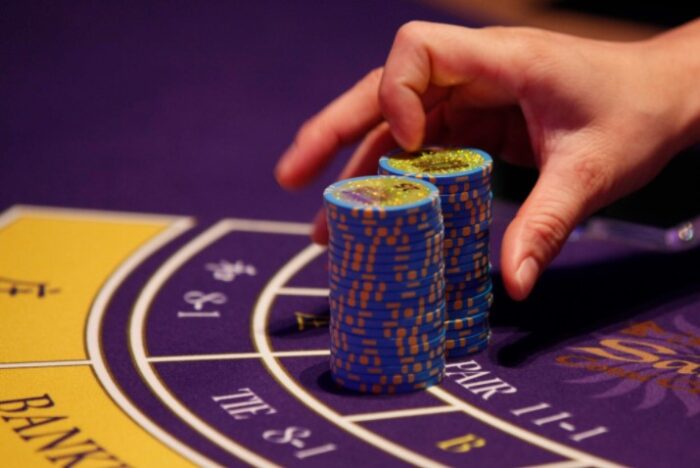
Winning a gaming license in the Far East is a highly competitive process contested by extremely large international casino corporations. Only a select few gain the coveted gambling concessions in Asia’s lucrative markets, notably Macau and more recently Singapore.
In 2002 Macau granted only three of these licenses, two of which went to foreign corporations discussed below.
In May 2004, Las Vegas Sands Corp. (LVS on NYSE) became the first North American casino company to open in Macau when it launched a destination casino that covers one million square feet. Building on its success in the Far East gambling industry, Sands has just won its bid to construct a new gaming resort in Singapore’s Marina Bay.
Wynn has sold its second license to build a resort in Macau to the Australian company Publishing and Broadcasting for a hefty $900 million.
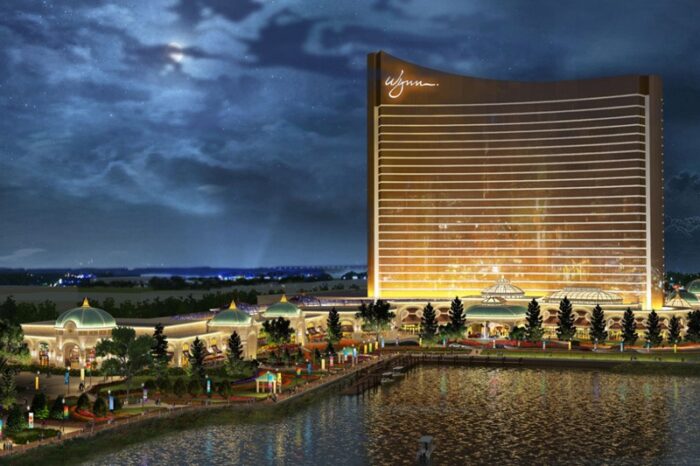
Key to the gaming industry’s success in Asia is integrated destination resorts with meeting, convention, and retail shopping spaces in addition to luxurious hotel accommodations. Casinos also bring in high-profile directors like James Cameron to design gaming attractions based on hit movies such as Titanic and Aliens. At least half of the gambling industry’s revenues come from food, entertainment, and accommodation sales that supplement wagering revenues.
For nervous investors who fear that Asian casinos will take business away from Las Vegas, bear in mind that foreign casinos in the Far East offer player bonuses and other incentives that motivate well-heeled oriental gamblers to also visit related luxury destinations casino brands in Las Vegas and Atlantic City. In addition, big bettors from Macau are likely to visit Las Vegas for its 6.75% gaming tax rate, which contrasts favorably with Macau’s tax rate of almost 40%.
Casinos Still Marketing Fun and Excitement
Casino stocks dropped heavily about a decade ago, but even in the despairing economy, the casinos themselves were still trying to sell thrills, fun, excitement, non-stop action, and “hot” slots. Those terms continued to run through much of their advertising. Hyperbole never had it so good.
Values in the Thalmann Gaming and Casino Investment Fund dropped from $12.28 in October 2007 to $2.78 on November 17, 2008, a 77 percent loss. That compares to the 5.74 percent loss that gamblers can expect on a roulette wheel, which probably offers the worst odds of any casino table game.
Today’s gambling industry is heavily integrated with hotel, resort, and food operations, making it difficult for outsiders to see where the biggest decline is occurring.
Dice Table Excitement
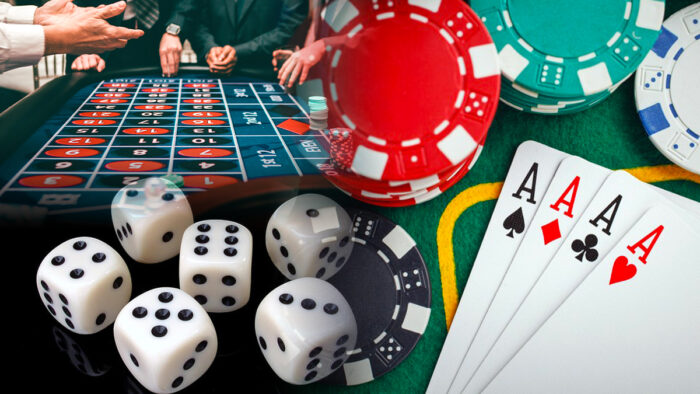
Perhaps the most typical scene in casino television commercials is a group of attractive women and men laughing, cheering and having a great time around a dice table. That’s probably because, as the Harrah’s Tunica website points out, dice tables normally attract “very gregarious” players. They generate the most interaction between players and the loudest cheers, as well as the loudest groans.
The dice table scene has become a casino advertising stereotype because although it is not always a jolly place, it comes closest to reflecting the fun and excitement that casinos try to market. One is less likely to find much excitement at the poker and roulette tables or along the long lines of slot machines that seem to simply mesmerize most players.
Non-Stop Action
The Atlantic City Hilton also promotes “non-stop action” and Harrah’s Tunica says “there’s never a dull moment on our lavishly decorated gaming areas!” Ameristar in Kansas City says “let the fun begin.” The Green Valley Ranch Casino.com refers to its “intimate in feel,” which apparently means something to some gamblers.
No casino, however, tops Trump in promoting excitement. The Trump casino website talks about “The Electricity. The Excitement” and “gaming that exhilarates.” It describes Pai Gow and poker as “exotic” and talks about “the thrills and chills of a baccarat or blackjack tournament.”
In their efforts to impress gamblers, casinos also stress big numbers. Trump trumpets its “nearly 80,000 square foot casino,” which apparently is a bit larger than the Atlantic City Hilton’s 75,374 square feet. Boulder Station boasts of its 8,000 square foot bingo hall. But do gamblers bring tape measures?
3000 Slots at Ameristar
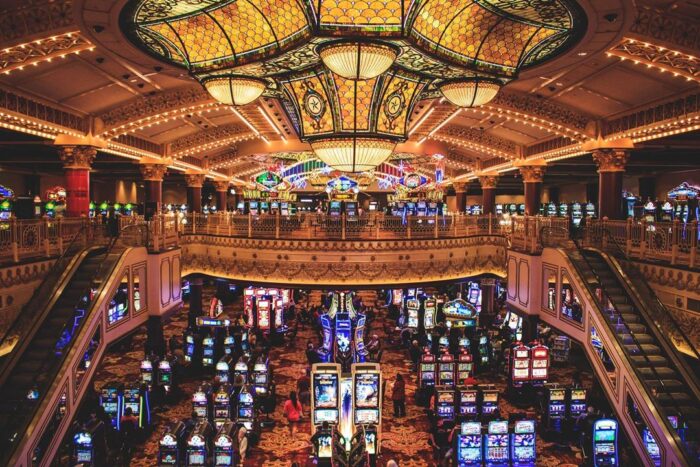
Ameristar in Kansas City talks of its 3000 slots and video poker machines, edging Boulder Station’s 2,900 slot and video poker machines in Nevada, and easily trumping Harrah’s 2000 in Tunica, Mississippi. But who’s counting beyond the few dozen a gambler is likely to use?
The casino companies today also heavily promote their hotel, entertainment and food offerings, since they are more likely to be treated as profit centers rather than the loss-leaders they once were.
Again, Trump shows the ways, promoting its “Trump lifestyle” and “unabashed luxury,” as well as “Dining that satisfies. Spas that soothe. Accommodations that inspire.”
Hot Slots and Loose Slots
For many reasons, casinos still tread lightly around the gambler’s chances of winning. The closest they seem to get is their promotion of “hot slots,” which sounds exciting, and “loose slots,” which convey some vague promise in gambler lingo. Harrah’s Tunica refers to its “big-money progressive slots” without saying whether that’s big money going in or coming out. Trump talks about “a lot of different ways to win at our slot machines.”








